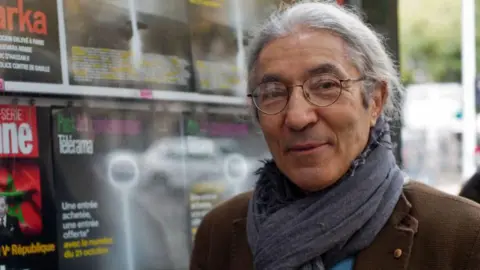 Getty Images
Getty ImagesFrance’s Emmanuel Macron has joined calls for information about Franco-Algerian novelist Boualem Sansal, who has gone missing after he flew to Algiers last Saturday.
An outspoken critic of the Algerian regime, Sansal is reported by some French media to have been arrested by Algerian police when he stepped off the plane.
“The president is very concerned and is following the situation closely,” a spokesman at the Elysée palace said. “He holds very dear the freedom of this great writer and intellectual.”
Several other prominent French politicians, mainly on the centre and right, have voiced their fears for Sansal, who made regular appearances on French media criticising both the Algerian government and the rise of Islamism.
By Friday there had been no official reaction in Algeria to the French concerns.
Former prime minister Edouard Philippe said he was “profoundly worried… [Sansal] embodies all that we cherish. He stands for reason, freedom and humanism against the forces of censorship, corruption and Islamism”.
Far-right leader Marine Le Pen called him a “fighter for liberty and a courageous opponent of Islamism.”
The disappearance of Sansal, 75, was first reported by friends in Paris, who found that his mobile telephone had gone dead and were told that he had not arrived at his home in Boumerdès.
Among his supporters is the writer Kamel Daoud, another Franco-Algerian critic of the government in Algiers who earlier this month was awarded France’s top book award for a novel about the bloody Algerian civil war of the 1990s.
It was announced only this week that Daoud was being sued in Algeria for allegedly stealing his story from a survivor of the civil war, and for breaching a 2005 “reconciliation law” which restricts public comment on the conflict.
Saada Arbane said she had had several psychiatric sessions with Daoud’s future wife, Aicha Dahdouh. The BBC has approached Daoud for comment.
 Getty Images
Getty ImagesIn an article published Friday in Paris, where he now lives, Daoud expressed concern for his “friend” Sansal, who he was sure had been arrested.
“Being a writer in Algeria is an onerous task. The regime does not at all appreciate the profession and the Islamists are in expansion mode…. Indeed the armed wing [of the Islamists] is the regime,” he wrote.
The difficulties facing the two writers have stoked fears of a vendetta being conducted by the Algerian government in response to an apparent switch in policy by President Macron towards friendship with Morocco, and away from Algeria.
Antoine Gallimard, of Daoud’s publishing firm Gallimard, said that the lawsuits against the writer were proof of a “campaign of violent defamation orchestrated by certain media close to the (Algerian) regime.”
Last month Macron made a state visit to Morocco, during which he declared French support for Moroccan claims to sovereignty over the disputed territory of Western Sahara. Algeria is the historic backer of the independence movement Polisario.
Macron’s move angered many Algerians, who view the award of France’s Prix Goncourt to Daoud as a political rather than a literary gesture.
Elysée officials have told journalists that Macron was frustrated by his repeated attempts to build bridges to Algeria constantly coming to nothing because of Algerian stonewalling.
Some French media speculated that Sansal had been arrested in connection with a recent interview in which he appeared to question Algerian historic sovereignty over parts of its territory adjoining Morocco. He also said Polisario had been “invented” by Algeria to “destabilise Morocco”.
Over the years Daoud and Sansal have both attracted the wrath of official circles in Algeria, where they are regularly accused of selling out to the former colonial power.
Sansal was trained as a scientist and had a senior position in the Algerian interior ministry before being sacked after publication of his first novels. He was fiercely attacked for attending a book fair in Jerusalem in 2012.
Daoud, 54, began his career as a journalist covering the massacres of the civil war, in which up to 200,000 people were killed.
He became a newspaper columnist and won international acclaim in 2015 for his first novel The Meursault Investigation, which was a reworking of The Stranger by Albert Camus.
Additional reporting by Ahmed Rouaba.
